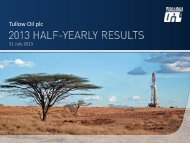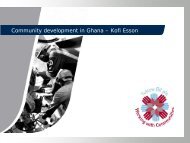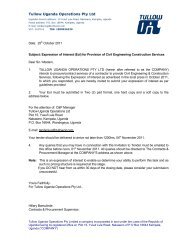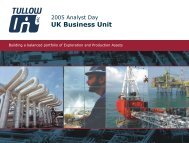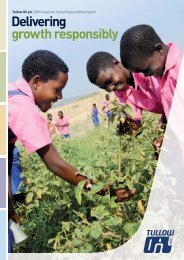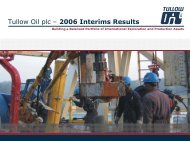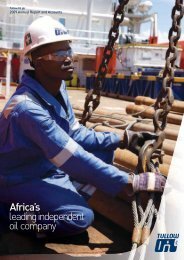Jubilee field development The story so far (PDF - Tullow Oil plc
Jubilee field development The story so far (PDF - Tullow Oil plc
Jubilee field development The story so far (PDF - Tullow Oil plc
Create successful ePaper yourself
Turn your PDF publications into a flip-book with our unique Google optimized e-Paper software.
<strong>Jubilee</strong> ESIA continued<br />
Routine discharges (such as waste water from the FPSO) and drilling wastes will<br />
be treated to accepted standards prior to discharge.Non-routine discharges (such as<br />
chemically treated hydrotest water) will be collected in a closed system and treated to<br />
meet Ghanaian and international standards. <strong>The</strong> selection of fluids will take into<br />
account their potential environmental impacts.<br />
Impacts from emissions to air are unlikely to have a direct impact on local<br />
communities. Our operations will produce Greenhouse Gas (GHG) emissions but we<br />
are working to minimise these through the use of state-of-the-art equipment,<br />
application of EHS policy, Environmental Management Systems (EMS) and <strong>Tullow</strong> <strong>Oil</strong><br />
Environmental Standards (toes). Flaring will be avoided wherever possible with the<br />
stated intention to flare only in specified situations. Water discharges from the FPSO<br />
and support vessels will all be treated prior to discharge to ensure that they meet<br />
both Ghanaian and industry standards.<br />
<strong>The</strong> scale and nature of waste produced will vary depending on operations that are<br />
being carried out. Some waste, such as macerated food waste, can be treated and<br />
disposed of at sea in accordance with MARPOL, the International Convention for<br />
the Prevention of Maritime Pollution from ships. Other non-hazardous waste will<br />
be brought ashore for treatment, recycling and disposal. Hazardous waste will<br />
be transported ashore for disposal at appropriate facilities.<br />
Results of the impact assessment carried out as part of the ESIA process show that<br />
the risk of an oil spill is very slight. We have however put in place a comprehensive<br />
<strong>Oil</strong> Spill Contingency Plan (OSCP) to ensure that in the event of a spill we are ready to<br />
take appropriate action. We have al<strong>so</strong> helped to form the Ghana Offshore Emergency<br />
Leadership Forum (GOELF), which consists of Ghanaian agencies that would be<br />
involved in the event of an incident.<br />
We are working closely with the Ghanaian Fisheries Agency and fishing community to<br />
alleviate any concerns and issues around the presence of the FPSO. This includes<br />
both direct and indirect assistance ranging from compensation procedures, to<br />
assistance with locating alternative fishing grounds. <strong>Tullow</strong> Ghana is al<strong>so</strong> working to<br />
educate the fishermen about potential safety issues caused by fishing close to our<br />
operations.<br />
<strong>The</strong> <strong>Jubilee</strong> ESIA discussions al<strong>so</strong> helped us to understand the most pressing needs<br />
of the six coastal communities of the Western Region and to identify the most<br />
appropriate Social Enterprise and <strong>so</strong>cial investment projects for the area. <strong>The</strong> drilling<br />
of water wells in the region, and our support of a programme to eradicate river<br />
blindness, were the first direct outcomes of the process. <strong>The</strong> information gathered by<br />
the ESIA al<strong>so</strong> allowed <strong>Tullow</strong> Ghana to develop a Social Enterprise strategy and<br />
management framework.<br />
12 <strong>Tullow</strong> <strong>Oil</strong> <strong>plc</strong> 13



